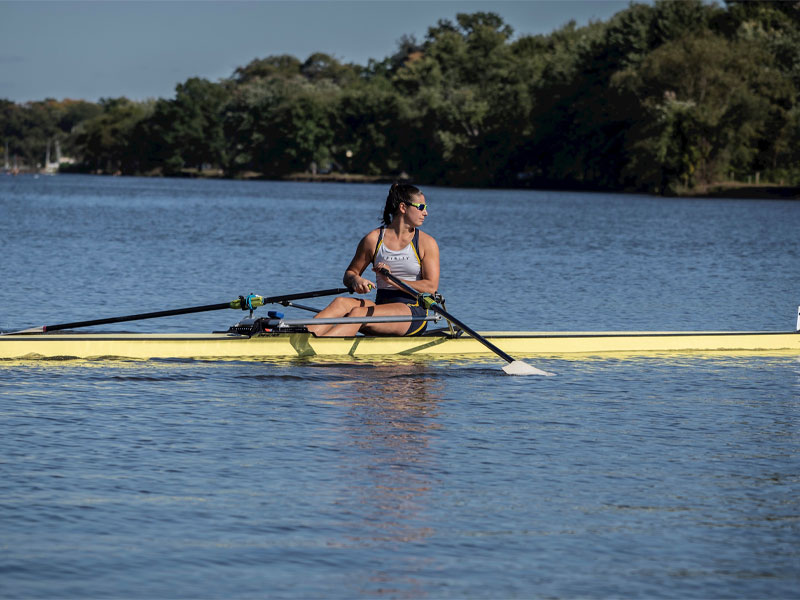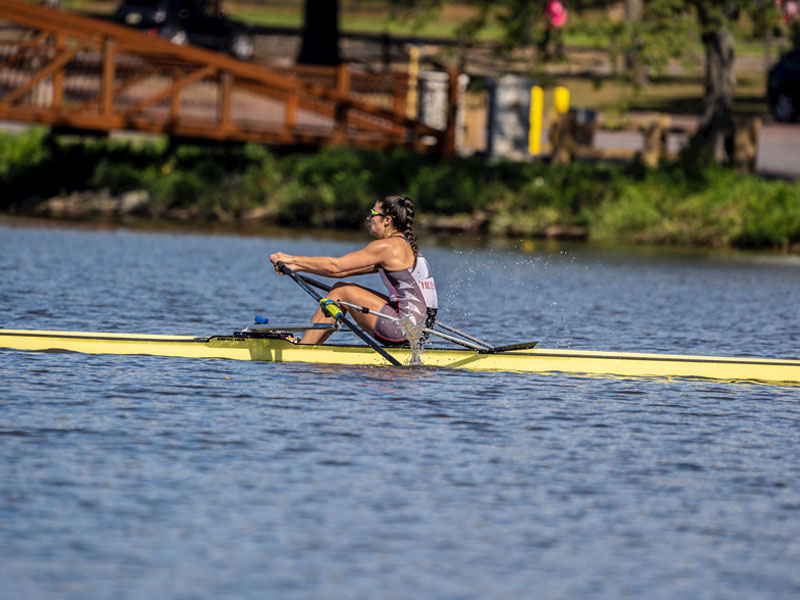
To this day, Cristina Pretto ‘12 still carries the Westover spirit with her. Those traits - a self-described grittiness, drive, and self-belief - are in part what propelled Cristina to get back into the sport of rowing and have the opportunity to compete at the U.S. Olympic Team Trials last month in Sarasota, Florida.
“We put in a lot of grit, (and) we always super believed in ourselves,” Cristina said, remembering her days as student-athlete at Westover. “I think the Westover spirit is very like that, how far I can push myself, but in a different way.”
Making her debut in the women’s single scull for rowing - a 2,000-meter race - Cristina was a top 16 finisher in the highly-competitive trials that featured 119 athletes and 91 boats in five boat classes. In the five-day event, Feb. 22-26 at Nathan Benderson Park, only one individual - Kara Kohler, the reigning world championships bronze medalist - earned a ticket in (single sculls) to Tokyo for the rescheduled 2020 Summer Olympics Games.
 “The thing I really wanted to prove was, I was supposed to be there,” Cristina said of competing at the trials. “And my times were right with everyone, which was really, really exciting.”
“The thing I really wanted to prove was, I was supposed to be there,” Cristina said of competing at the trials. “And my times were right with everyone, which was really, really exciting.”
Cristina’s path to the rowing trials started at Westover. After suffering a number of concussions, Cristina said she came to the realization that playing a contact sport collegiately was out of the question. But conversations with former athletic director Tiz Mulligan, sparked a new possibility - Mulligan suggested she look into rowing - a sport that is known for recruiting novice athletes without prior experience. Cristina was able to land a spot at Holy Cross (Worcester, Mass.) where she competed before transferring to Trinity College in Hartford. There, she was able to develop her craft and was a vital part of Trinity’s two NCAA Division III National Women’s rowing titles, earning All-American status. She won a Division III Team Championship in 2014 and an individual NCAA Championship in 2015 (for winning the Women’s Varsity 8 race).
“I’ve always been an athlete and the cool thing about rowing, even though it’s an endurance sport, it’s a team sport,” she said. “The basis of rowing is really how physically hard you can work; that’s it. I kind of liked that as a transition … I thought if you can put in enough hours, if you can listen to your coaches, you can actually succeed.”
After Trinity, Cristina took two years off from the sport when she was an assistant rowing coach at Northeastern University. She admits, though, the itch to get back into the water was there the whole time.
“You know you're kind of a bad coach when the whole time you’re coaching you’re like, ‘I just want to get in the boat,’” Cristina said with a smile.
So after some time away, Cristina, who now lives in Philadelphia, got back in the boat. Cristina, who trains professionally with Vesper Boat Club (High Performance Group), said it was a really daunting task to pick up rowing again. The transition to competing nationally not only meant getting back in shape, but learning how to scull.
“When I started again, I was really slow, really slow,” Cristina said. “And there’s two types of rowing - there’s one where you have one oar and one where you have two oars, it’s called sweeping or sculling. In the U.S. and in college, you pretty much only do sweep rowing, so having one oar. When you try to pursue the national team, you have to scull. So not only was I super unfit, I was also learning pretty much a completely new sport. So it was tough, but that's what’s pretty exciting about what just happened for me, where I performed pretty well at trials, because I've only been doing it for two-and-half years, and now I'm competing against literally the fastest women in the world.”
With the 2024 Olympics as her goal – and the pandemic postponing and presenting an extra year of training, it offered a unique opportunity, but one that also pushed her limits.
“I think if you talked to any rower, we all thought about quitting because it’s a lot,” Cristina said. “It was erging in my one-bedroom apartment on the rowing machine, our boathouse was closed so when it got freezing out, either you don't practice or you go freeze your butt off and handle it. It was definitely tough.”
Cristina, who serves on the Board of Governors, is also one of few rowers who works a full-time job - she’s an Account Executive for Bazaarvoice, a software company. A typical day for her starts at 6 a.m. with a three-hour practice consisting of a workout on the water or rowing machines or a lift. She'll work a full day, and then head to training for another round of practice in the late afternoon. On the weekends, with a little more time, Cristina will fit in three training sessions a day. As mind-boggling as her schedule sounds, Cristina wouldn’t have it any other way.
“I think most Westover girls hate being bored,” she said. “I don’t think I could work the high-stress job that I do or do rowing without each other; I really need it for that balance. And I think that’s what Westover will teach you; you can have multiple passions.”
At 27-years-old, Cristina’s first experience at the Olympic Trials was eye-opening in many ways. With the winter weather in Philadelphia freezing over the water, she and a teammate made a last-second decision to head down to North Carolina to train for some time before Florida.
“We trained on the open ocean with waves, and I sunk my boat for the first time, which has never happened before, so that was pretty crazy,” Cristina said with a laugh.
While Cristina said she did feel the pressure and some second-guessing came into play about making her debut in 2021 - and perhaps a foreseen bad omen with her sinking boat - Cristina’s performance in Florida was a reflection of that gritty, self-driven Westover spirit.
bad omen with her sinking boat - Cristina’s performance in Florida was a reflection of that gritty, self-driven Westover spirit.
On day one, the time trial, when nearly 70 percent of the field is eliminated, Cristina said they send you off by yourself, just you and your boat racing for time. She finished the trial in a time of 7:28.77.
“The goal from the beginning was to make it out of time trials,” she said. “I actually had what I would consider a bad race; I really race better when I’m next to people and I’m competing. When I got off the water, I actually started to take my boat apart. Then one of my teammates was like, ‘Congratulations, you did it.’”
Cristina said she didn’t believe him and grabbed his phone to look at the results. Her time was good enough for 15th overall; only 16 advanced to the quarterfinals.
While she knew it was a slim chance to advance to the top 8, as she was competing against some of her rowing idols, including two-time Olympian Genevra Stone, the future is bright.
“I’m honestly looking forward to continuing to build my skill,” Cristina said. “I have a lot of room to grow.”
Cristina said after the single trials, she took one day off and was back on the water. Next up for her is training for the double and quad trials later this spring. While she will surely bring that Westover spirit with her, she said one of the main things she remembers as a student at Westover and something that still motivates her, was its special connected environment.
“When I was at Westover, everyone was like, ‘Hey, you’re an athlete, you’re tough,’ and would really support you,” Cristina said. “I think that was really unique. You always had girls who were building you up.”


